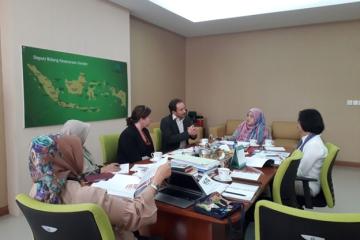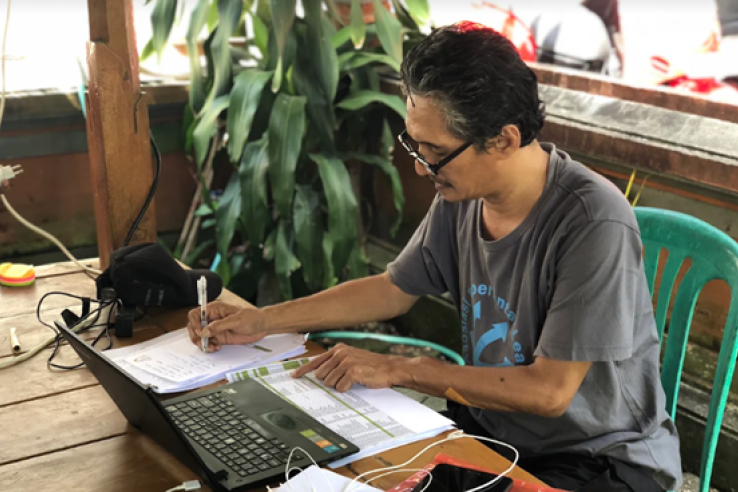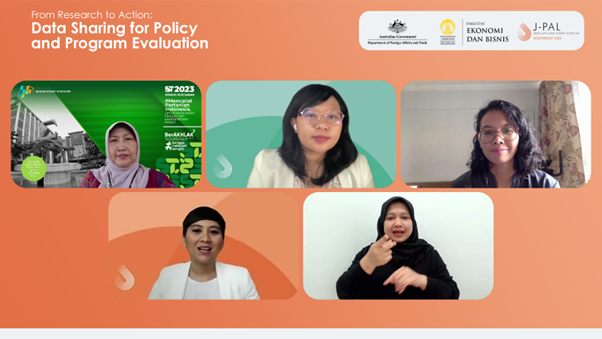
Improving data sharing practices: Developing a mutual understanding between researchers and policymakers

Accessibility, interoperability, openness, and security for data sharing between researchers and policymakers are key aspects of fostering evidence-based policymaking. In translating policy into action, researchers and policymakers equally face the need for data that is reliable, accurate, and up to date.
While Indonesia launched its Satu Data Policy (One Data Policy), a regulatory framework designed to transform data governance, in 2019, the need to continuously improve implementation still exists.
On May 17, J-PAL Southeast Asia (SEA) hosted a webinar to raise awareness about the importance of updated, secure, and ethical data sharing practices for evidence-based policymaking. The webinar featured remarks from Suprayoga Hadi, Executive Secretary of the National Team for the Acceleration of Poverty Reduction (TNP2K); Dwi Retno Wilujeng Wahyu Utami, Deputy Director of Statistics Dissemination at Statistics Indonesia (BPS); Vitasari Anggraeni, Partnership Manager at Pulse Lab Jakarta; and Poppy Widyasari, Associate Director of Research at J-PAL Southeast Asia.
Below are the key takeaways from the webinar.

1. Standardization to solve interoperability issues
The establishment of Satu Data Policy through Presidential Regulation No. 39 in 2019 laid the groundwork for the creation of more accurate, updated, unified, and accessible data in Indonesia. Nevertheless, several barriers still hinder the Government of Indonesia from harnessing the full potential of data, and improving implementation is a top government priority. One of the main challenges, according to Dwi Retno Wilujeng Wahyu Utami (BPS), is the high number of data centers that use different standards of protocol and data structure.
The key to addressing this, according to Dwi, is to strengthen the government’s supervisory role to ensure that metadata, references, and other miscellaneous information are attached to the data to prevent misinterpretation. BPS, along with the Ministry of Communication and Informatics, is collaborating to further strengthen this policy by setting up data infrastructure, connecting data portals, and improving data identification by attaching metadata to each available dataset.
2. Improving governance and data security to increase data sharing and protect privacy
Vitasari Anggareni of Pulse Lab Jakarta underlined how statistics collected by the Indonesian National Railway Company (KAI) on the number of women passengers who board the evening train can be translated into policy recommendations to support inclusive transport for women—for example, by improving security aspects at the train station.
Vitasari also emphasized the importance of ethical and secure data management: behind the huge potential of administrative data, there is a risk of misuse if data contains personally identifiable information and sensitive information such as names, gender, address, and age are not managed with the best practice in data handling and not processed by using secure statistical tools. If not addressed properly, stakeholders within the sector-specific data sharing ecosystem may be trapped in mutual suspicion, causing a loss-loss situation for both data users and data owners.
One key to addressing this issue is to develop mutual trust by establishing comprehensive data governance that clearly defines the scope of responsibility between data owners and data users. Adopting a privacy commitment as well as laying out protective measures for data security and privacy in the Data Use Agreement between stakeholders can ensure all parties are using data appropriately according to their respective mandate.
Vitasari noted that another equally important aspect that the data owner needs to develop is a risk and benefit analysis that can help identify which data belongs to the public and private domains.
When stakeholders involved in the data-sharing chain develop mutual trust and a shared commitment to best practices, data-sharing will happen more frequently and more effectively.
3. Communication and capacity building to develop mutual trust between data owners and data users
J-PAL’s Poppy Widyasari discussed how J-PAL’s own data security practices can serve as an example of how to improve data governance at the institutional level.
Across all J-PAL projects, for example, only authorized personnel can access data that contains personally identifiable information. This is strengthened by an additional layer of data transfer protocol mandating that all data is stored in an encrypted folder and transferred in secure channels every time J-PAL conducts an external data transfer.
As Poppy highlighted, researchers also need to inform data owners of how a particular data set will be used. Reflecting on the experience of J-PAL SEA, this practice of openness can help develop mutual trust, which is useful in facilitating the sharing of potentially sensitive information.
Capacity building can also help inform partner institutions about the importance of prioritizing data security. This can come in the form of training and workshops, or appointing a designated person to work from the partner’s office and provide technical assistance related to administrative data.
Looking forward
Indonesia is well on its way to improving data sharing regulation, practices, and collaboration for evidence-based policymaking. With support from the Government of Indonesia, institutions, implementers, NGOs, and researchers, J-PAL SEA looks forward to continuing to provide capacity building and training that may help the Government benefit from evidence generated by high-quality data in Indonesia.
To learn more about data security, ethics, and more, explore J-PAL’s research resource, “Using administrative data for randomized evaluations,” and read J-PAL’s in-depth Handbook on Using Administrative Data for Research and Evidence-based Policy.
Read part two of this post on "Research to Action: Policymakers and Academics Collaboration."


